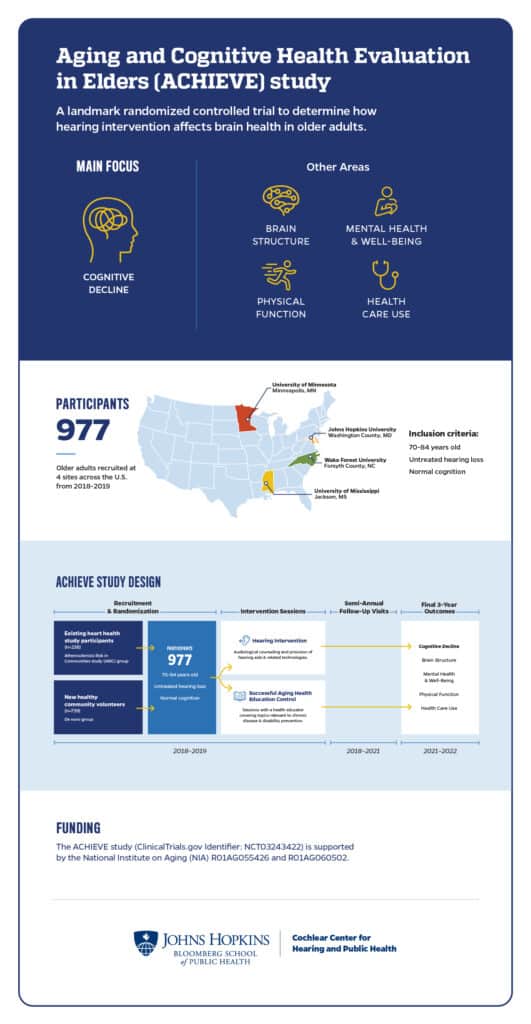AMSTERDAM, NETHERLANDS — The results of the groundbreaking Aging and Cognitive Health Evaluation in Elders (ACHIEVE) study, the largest randomized, controlled clinical trial of hearing aids for reducing long-term cognitive decline in older adults, were unveiled for the first time at the Alzheimer’s Association International Conference® (AAIC®) 2023, held in Amsterdam, Netherlands, and online.
While the results were negative in the total study population, the hearing intervention slowed cognitive decline in older adults with mild to moderate hearing loss by 48% in a pre-specified segment of the study population consisting of the 238 people participating in an ongoing observational study of heart health. The findings from the ACHIEVE study were simultaneously published in The Lancet.
ACHIEVE Study Overview
 The ACHIEVE study is a comprehensive randomized trial encompassing older adults aged 70 to 84 years with untreated hearing loss and free from substantial cognitive impairment.
The ACHIEVE study is a comprehensive randomized trial encompassing older adults aged 70 to 84 years with untreated hearing loss and free from substantial cognitive impairment.
Conducted across four prominent research sites in the United States, a total of 977 participants were recruited from two distinct study populations. The first group consisted of 238 adults already engaged in the Atherosclerosis Risk in Communities (ARIC) study, while the second group involved 739 healthy community volunteers who were newly recruited for this groundbreaking investigation.
Intervention and Comparison Groups
The three-year intervention program involved the use of hearing aids, a hearing “toolkit” designed to facilitate self-management, and continuous instruction and counseling provided by experienced audiologists. In contrast, the comparison group received talk sessions with a health educator, with a focus on chronic disease prevention.
Insightful Subgroup Analysis
The primary endpoint of the study centered on the three-year change in a comprehensive neurocognitive testing battery, thoughtfully designed to account for any potential influence of hearing loss on the results.
While the overall results comparing the hearing intervention group to the control group in the total study population yielded negative outcomes, the researchers were particularly intrigued by the insightful subgroup analysis.
Encouraging Future Investigations
The ACHIEVE researchers noted that participants from the ARIC study displayed higher risk factors for cognitive decline, lower baseline cognitive scores, and a faster rate of three-year cognitive decline compared to the other group.
Encouragingly, the positive results from the hearing intervention in the ARIC subgroup analysis warrant further investigation and exploration.
Hearing Loss as a Global Priority
According to the ACHIEVE researchers, hearing loss is present in an astonishing 65% of adults over the age of 60. Given its prevalence and potential implications for cognitive decline and dementia risk, identifying effective dementia prevention strategies that can be implemented globally has become an urgent priority.
Hearing Intervention’s Impact on Cognitive Health
Frank Lin, M.D., Ph.D., from Johns Hopkins University School of Medicine and Bloomberg School of Public Health, and co-primary investigator of the ACHIEVE study, highlighted the significance of the hearing intervention’s impact on reducing cognitive change in older adults at increased risk for cognitive decline. He emphasized that hearing loss is treatable in later life, making it a crucial public health target in the effort to reduce the risk of cognitive decline and dementia.
Alongside other dementia risk factors such as less education in early life, high blood pressure, social isolation, and physical inactivity, hearing intervention holds the potential to play a pivotal role in enhancing cognitive health among older adults.
Holistic Approach to Dementia Risk
 Maria C. Carrillo, Ph.D., Alzheimer’s Association chief science officer, emphasized that the encouraging subgroup results align with the understanding that effective strategies to reduce cognitive decline and dementia risk may need to address multiple pathways simultaneously.
Maria C. Carrillo, Ph.D., Alzheimer’s Association chief science officer, emphasized that the encouraging subgroup results align with the understanding that effective strategies to reduce cognitive decline and dementia risk may need to address multiple pathways simultaneously.
She highlighted the Alzheimer’s Association’s ongoing U.S. POINTER Study, which adopts a comprehensive approach by targeting multiple risk factors in a diverse, representative study population.
The findings from the ACHIEVE study suggest that older adults at increased risk for cognitive decline and dementia, who also experience hearing loss, may derive the most substantial benefit from the hearing intervention within a three-year timeframe.
In the study, in a subgroup of older adults with hearing loss who were at higher risk of cognitive decline, using hearing aids for three years cut cognitive decline in half.
The researchers propose that the hearing intervention may exert its influence by making listening easier for the brain or by helping individuals remain socially and physically active, contributing to reduced cognitive decline.
Amidst ongoing investigations, the researchers recommend that older adults prioritize regular hearing check-ups and promptly address any hearing issues to improve overall health and well-being.
Future Research Directions
Further research is warranted to delve deeper into how hearing aids and counseling contribute to the cognitive benefits observed, and to explore the long-term advantages of the hearing intervention in promoting cognitive health.
Lancet Publication Details
- Lin, et al. Effects of hearing intervention on cognitive decline: Results of the Aging and Cognitive Health Evaluation in Elders (ACHIEVE) randomized trial. (Funders: R01AG055426, R01AG060502, and R34AG046548 from the U.S. National Institute on Aging, part of the National Institutes of Health; ClinicalTrials.gov identifier: NCT03243422)
About the Alzheimer’s Association®
The Alzheimer’s Association is a global voluntary health organization dedicated to Alzheimer’s care, support, and research. Its mission is to lead the way to end Alzheimer’s and all other dementia—by accelerating global research, driving risk reduction and early detection, and maximizing quality care and support. The vision is a world without Alzheimer’s and all other dementia. For more information, please visit alz.org or call 800.272.3900.
Source: AA, Lancent






